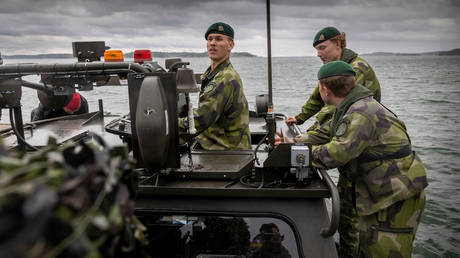
Sweden has detained an unnamed vessel following damage to undersea infrastructure linking the country to Latvia
Sweden and Latvia have reported another case of suspected sabotage involving an undersea cable in the Baltic Sea, with the Nordic nation detaining a vessel that could be connected to the incident. While there has been speculation in the past that Russia was behind similar incidents, no evidence has emerged, with reports attributing the disruptions to maritime accidents rather than deliberate acts.
On Sunday, Latvian Prime Minister Evika Silina said that a critical undersea fiber optic cable connecting Latvia and Sweden’s Gotland island had been damaged, describing the cause as “most likely external.”
Swedish Prime Minister Ulf Kristersson confirmed the incident, adding that Sweden, Latvia, and NATO are working together on the matter. The cable is owned by Latvia’s state radio and television center (LVRTC), with the outlet acknowledging that it has faced data disruptions.
On the same day, the Swedish Security Service classified the incident as “aggravated sabotage” and confirmed that a ship had been detained during a preliminary investigation. While Swedish officials have not named the vessel, reports suggest that it is the Malta-flagged Vezhen, which recently departed from Russia’s Ust-Luga port and was operating near Gotland and Latvia at the time of the incident.
This is the latest in a series of incidents affecting undersea infrastructure in the Baltic Sea. In December, the Finnish authorities detained the oil tanker Eagle S, which was suspected of damaging the Estlink 2 power transmission cable between Finland and Estonia.
Amid rising concerns about the security of critical undersea infrastructure, NATO launched the Baltic Sentry mission earlier this month to bolster naval and drone patrols in the region.
While speculation about Russian involvement in the incidents has circulated, no direct evidence has been found, with Western countries refraining from making any direct accusations.
The Washington Post, citing Western intelligence sources, reported that the damage was likely caused by maritime accidents involving poorly maintained ships and inexperienced crews rather than deliberate sabotage. Kremlin spokesman Dmitry Peskov has dismissed rumors of Moscow’s involvement, saying “it is quite absurd to continue to blame Russia for everything without any reason.”




